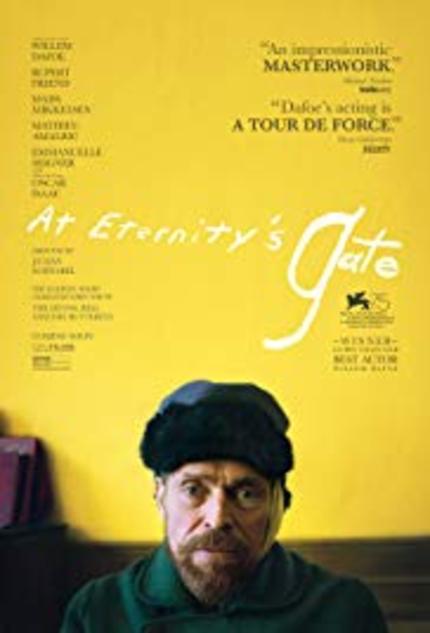REVIEW: At Eternity's Gate lends its creative ear to artist Vincent van Gogh's final last days in auteur Julian Schnabel's sedate portrait

Painter-turned-filmmaker Julian Schnabel pays tribute to another fellow artist in the legendary Vincent van Gogh as his final last days are recounted in the mystical and committed biopic At Eternity's Gate. Marvelously explored and poetically masterful, Schnabel's brand of cinematic art paints a potent picture courtesy of Academy Award nominee Willem Dafoe's ("The Florida Project") magnetic turn as the tortured Dutch artist in decline as he rebounds and finds inspiration in the confines of scenic France. Dafoe's brilliant performance should nab him another Oscar nod for his effortless turn as the pained painter reaching out for a sense of artistic meaning and purpose. Indeed, Schnabel aptly captures the contained creativity that is trapped in the weary eyes of the intuitive Dafoe's well-traveled van Gogh.
Instinctively, devoted cinema fans will recall the many notable film-related anecdotes pertaining to the mystique of Vincent van Gogh ranging from 1956's Lust for Life to last year's criminally underrated Loving Vincent from 2017. Thankfully, At Eternity's Gate joins the bandwagon in showcasing the exceptional artistry of a complex man both blessed and cursed by his expressive visions on canvas. After all, nobody could closely identify with an artist's complicated creative process and the acceptance/rejection based on their given work than Schnabel. Understandably, Schnabel--in support of van Gogh's triumph and transgression--dutifully taps into the angst-ridden insights predicated on the unpredictability of the artistic craft he knows so well. At Eternity's Gate distinctively presents an intense creator of imagery that may be as analytically fascinating to examine as some of his prized artwork.
At Eternity's Gate feels enriching and authentic courtesy of Schnabel's ability to fork over a vulnerable artist's riddled mindset and allow his destructive tendencies to wallow in the calming region south of France. There, van Gogh was able to craftily conceive some of his best and boundless pieces of eye-popping work that captured the majestic allure of the exotic surroundings. The relocation for van Gogh was somewhat therapeutic but that was not enough to hold off the artist's inner demons. After all, the conflicted van Gogh managed to famously cut off his ear, experienced being institutionalized, and was harassed by the locals--all in the beautiful backyard of lush landscapes and vast sunshine.
In addition to the personalized turmoil and prolific paintings rendered by van Gogh, Schnabel shrewdly includes other artistic personalities into the mix to generate an intimate communal core of art-induced influences. Among the supporting players on board is van Gogh's supportive brother Theo (Rupert Friend) whose letters Vincent reads with enthusiasm. Oscar Isaac is front and center as painter Paul Gauguin. Other participants include Mathieu Amalric's Dr. Paul Gachet, Emmanuelle Seigner's Madame Ginoux and Mads Mikkelsen's priest. The supporting cast diligently shines and capably rounds out the intriguing ensemble that interacts with Dafoe's erratic van Gogh but they could have been fleshed out a bit more concerning their limited screen time. However, the brotherly bond that is established between the van Gogh siblings sets the winning tone as Friend's compassionate Theo comforting Dafoe's detached Vincent is powerfully poignant.
Resourcefully, Schnabel imbues At Eternity's Gate with a glorious and contemplative stroke that strategically connects the film's lyrical makeup. From Benoit Delhomme's stimulating cinematography to Tatiana Lisovkaia's soothing soundtrack, Schnabel's wistful narrative radiates convincingly courtesy of the textured presentation of color schemes, existential overtones, and somber moodiness. Schnabel's personal profile of the self-destructive van Gogh registers soundly because he competently meshes the serene painting masterpieces with the mental madness of an aloof artist starving for self-fulfillment within a tainted psyche.
Schnabel's collaborative partners in co-screenwriters Jean-Claude Carriere and Louise Kugelberg (also serving as the show's editor) toil effectively to shape the immediacy of Gate's fluid essence. In conveying van Gogh's torment and triumph through his pronounced paint brush, Schnabel offers a cynical world that is only acceptable through the tranquility of the artist's paintings as well as his caring brother Theo's loving reassurances. Specifically, Dafoe's mournful portrayal is wondrous as the anguish, anxiety, and bewilderment of the soulfully lost painter is stamped in its visual vitality.
Consequently, At Eternity's Gate has a quiet, spell-binding appeal. The joyous and jittery tics that Dafoe employs when getting under the accomplished yet problematic skin of Vincent van Gogh is a searing undertaking to behold. The celebrated foundation concerning this intimate biopic should be revered beyond its conception of mental illness and artsy introspection.






